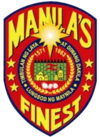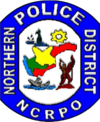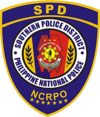National Capital Region Police Office
Metro Manila regional unit of the Philippine National Police From Wikipedia, the free encyclopedia
The National Capital Region Police Office (NCRPO) is a regional unit of the Philippine National Police (PNP) that has jurisdiction over Metro Manila, also known as the National Capital Region. It is headquartered in Camp Bagong Diwa.
| Philippine National Police National Capital Region Police Office | |
|---|---|
 Seal | |
| Abbreviation | PNP NCRPO |
| Motto | We Care, We Dare |
| Jurisdictional structure | |
| Operations jurisdiction | Metro Manila, Philippines |
 | |
| Map of Metro Manila showing the jurisdiction of the NCRPO's five police districts. | |
| General nature | |
| Operational structure | |
| Headquarters | Camp Bagong Diwa, Lower Bicutan, Taguig |
| Agency executives |
|
| Parent agency | Philippine National Police |
| Facilities | |
| Commands | |
| Website | |
| ncrpo | |
History
Summarize
Perspective
As PC METROCOM
The Philippine National Police - National Capital Region Police Office (PNP NCRPO) was established as the Philippine Constabulary Metropolitan Command (PC METROCOM) on July 5, 1967, through Executive Order No. 85 of then President Ferdinand Marcos. It was founded as the Special Strike Force of Police Forces in the area which would later be known as Metro Manila. The establishment was a response to the increase of criminality in then existing four cities and thirteen municipalities in the area.[1]
The METROCOM was tasked to conduct operations against threats to national security in the Metropolitan Manila area as well as support to the local police forces of the localities in their suppression and prevention of crime. The Metropolitan Police Force was later established on March 21, 1974, through Presidential Decree No. 421 issued by then-President Ferdinand Marcos. The decree consolidates the police, jail, and fire departments in the Metropolitan Manila area and placed them under the Commanding General of the METROCOM which served as head of the unit.[1]

As PC Capital Region Command
Following the People Power Revolution of February 1986 which ousted Marcos as president, the PC METROCOM was renamed as the Philippine Constubulary Capital Region Command (PC CAPCOM). The Philippine Constubulary (PC) itself would be abolished through Republic Act 6975, the Department of Interior and Local Government Act of 1990, passed by the 8th Philippine Congress and [1] signed by then President Corazon Aquino in December 1990. The Philippine National Police (PNP) was established as in PC's place.
PNP CAPCOM
Under the Republic Act 6975, two regional offices were created for Metro Manila, North CAPCOM and South CAPCOM (consists of Manila, Makati, Pasay, Paranaque, Pateros, Muntinlupa, Las Pinas and Taguig). These offices were deactivated and reunified on April 12, 1993.[1]
As PNP NCRC and PNP NCRPO
In 1994, the PNP CAPCOM was renamed as the National Capital Region Command (PNP NCRC) and was renamed again in June 1996 to its current name, the PNP National Capital Region Police Office (PNP NCRPO) through NAPOLCOM Resolution No. 96-058.[1] In early 1999, the PNP NCRPO launched its first website ("metromanilapolice.info.com.ph").[2]
On January 3, 2025, 2,264 intelligence officers from the National Capital Region Police Office (NCRPO) in the Philippines underwent drug testing, with all results returning negative. NCRPO chief Brig. Gen. Anthony Aberin stated that the outcome underscores the commitment to maintaining the integrity of intelligence officers, who play a crucial role in anti-drug operations. Additionally, on January 8, 2025, the Internal Affairs Service (IAS) conducted drug tests on 128 IAS officers and personnel at Camp Crame in Quezon City.[3]
Divisions
Summarize
Perspective
District Offices
The PNP NCRPO has five police districts under it. Among the localities in Metro Manila, Manila and Quezon City are the only localities to have a dedicated police district.

| District | Jurisdiction | District Director | |
|---|---|---|---|
 | Eastern Police District (EPD) | PCol. Villamor Q. Tuliao (Acting) | |
 | Manila Police District (MPD) | City of Manila | PBGen. Arnold Thomas C. Ibay |
 | Northern Police District (NPD) | PCol. Josefino D. Ligan (Acting) | |
 | Quezon City Police District (QCPD) | Quezon City | PCol. Melecio M. Buslig Jr. (Acting) |
 | Southern Police District (SPD) | PBGen. Manuel J. Abrugena | |
Regional Headquarters Command Group
- Office of the Regional Director
- Office of the Deputy Regional Director for Administration
- Office of the Deputy Regional Director for Operations
- Regional Directorial Staff
- Secretary to the Directorial Staff
- Office of the Spokesperson
Regional Directorial Staff
- Regional Personnel and Records Management Division
- Regional Intelligence Division
- Regional Operations Division
- Regional Logistics and Research Development Division
- Regional Community Affairs and Development Division
- Regional Comptrollership Division
- Regional Investigation and Detective Management Division
- Regional Learning and Doctrine Development Division
- Regional Plans and Strategy Management Division
- Regional Information and Communications Technology Management Division
- Regional Public Information Office
- Regional Executive Senior Police Office
- Regional Mobile Force Battalion
- Regional Headquarters Support Unit
- Regional Personnel Holding and Accounting Unit
- Presidential PNP Security Force Unit
Support Units
- Regional Highway Patrol Unit, NCRPO
- Regional Forensic Unit, NCRPO
- Regional Criminal Investigation and Detection Unit, NCRPO
- Regional Special Operations Unit
- Regional Anti-Carnapping Unit
- Regional Drug Enforcement Unit
- Regional Complaints Referral and Monitoring Center
- Regional Special Operating Unit
- Regional Tactical Operations and Intelligence Center
- Regional Internal Affairs Service, NCRPO
- Regional Medical and Dental Unit, NCRPO
- Regional Finance Service Office 16, NCRPO
- Regional Chaplain Service, NCRPO
- Regional Communications and Electronics Unit, NCRPO
- Regional Engineering Unit, NCRPO
- Regional Legal Service, NCRPO
- Regional Special Training Unit, NCRPO
- Regional Aviation Security Unit, NCRPO
- Regional Maritime Unit, NCRPO
- NCR Training Center
List of Regional Directors
| Name | Term | Former Position | New Position |
|---|---|---|---|
| As Commanders of Capital Region Command (PNP CAPCOM, North and South) | |||
| Pedro Sistoza[4] (North CAPCOM) |
1991 – 1993 | ||
| Marino Filart[5][6] (South CAPCOM) |
1991 – 1992 | ||
| Oscar Aquino (South CAPCOM)[7][8] |
1992 – 1993 | ||
| Orlando Macaspac (South CAPCOM) |
1993 | ||
| As Director of Capital Region Command (PNP CAPCOM) | |||
| Orlando Macaspac | April 13 – 25, 1993 | ||
| Pedro Sistoza[9] | April 25, 1993 – 1994 | ||
| As Director of National Capital Region Command (PNP NCRC) | |||
| Pedro Sistoza | 1994 | ||
| Recaredo Sarmiento II[10] | January 2, 1994 – July 8, 1994 | SAF commander (June 6, 1992 – January 2, 1994) | PNP Chief (July 8, 1994) |
| Jewel Canson[11] | 1994 – 1995 | ||
| Leandro Mendoza[12] | 1995 – 1996 | Regional Command 4 (RECOM 4) | PNP Directorial Staff chief |
| As Director of the National Capital Region Police Office (NCRPO) | |||
| Hermogenes Ebdane[13][14] | 1996 – 1998 | ||
| Reynaldo Wycoco[15] | 1998–1999 (OIC) | ||
| Edgar Aglipay | 1999 – 2001 | ||
| Romeo Peña[a][16][17][18] | 2001 | Died in office[19] | |
| Edgar Galvante[a][18] | 2001 – 2002 | Deputy chief for operations | |
| Reynaldo Velasco[a][20][21][22] | 2002 – 2003 | Philippine Center for Transnational Crimes (PCTC) | |
| Ricardo de Leon[23] | 2003 – 2004 | Police Community Relations Directorate | Philippine Center for Transnational Crimes (PCTC) |
| Avelino Razon[23][24] | 2004 – 2005 | PNP Head of the Directorate for Operations | Directorial Staff Chief |
| Vidal Querol[24] | 2005 – 2006 | Northern Police District director from 2001 to 2002.[24] | Retires |
| Reynaldo Varilla[25][26] | 2006 – 2007 | head of the PNP’s Directorate for Intelligence (DI) | |
| Geary Barias[27][28] | 2007 – 2008 | ||
| Leopoldo Bataoil[29][30] | 2008 – 2009 | ||
| Roberto Rosales[30] | 2009 – 2010 | Chief of Manila Police District | |
| Leocadio Santiago Jr.[31] | 2010 – 2011 | Dismissed | |
| Nicanor Bartolome[32] | 2011 | Directorial Staff Chief | |
| Alan Purisima[32] | 2011 – 2012 | Police Regional Office 3 (PRO3) | Directorial Staff Chief |
| Leonardo Espina[33] | September 6, 2012 – July 11, 2013 | Director of the PNP Highway Patrol Group | Directorial Staff Chief |
| Marcelo Garbo | July 11, 2013 – December 11, 2013 | Director of the Police Regional Office 7 (PRO 7) | |
| Carmelo Valmoria | December 11, 2013 – July 15, 2015 | ||
| Joel Pagdilao | July 29, 2015 – July 3, 2016 | District Director, QCPD | |
| Oscar Albayalde | July 4, 2016 – April 19, 2018 | Deputy Director, PNP Directorate for Plans | promoted as PNP Chief |
| Camilo Cascolan | April 19, 2018 – June 1, 2018 | Director, Directorate for Operations | reassign as Director for PNP Civil Security Group |
| Guillermo Eleazar | June 1, 2018 – October 16, 2019 | Regional Director, PRO-4A | promoted as Chief of Directorial Staff |
| Debold Sinas | October 16, 2019 – November 10, 2020 | Regional Director, PRO-7 | promoted as PNP Chief |
| Vicente Danao | November 10, 2020 – March 1, 2022 | Regional Director, PRO-4A | promoted as Chief of Directorial Staff |
| Felipe R. Natividad | March 1, 2022 – August 8, 2022 | Director, PNP Special Action Force | promoted as Commander of Area Police Command, Northern Luzon |
| Jonnel C. Estomo | August 8, 2022 – February 23, 2023 | Regional Director, PRO-5 | promoted as Deputy Chief for Operations |
| Edgar Allan O. Okubo | February 23, 2023 – July 7, 2023 | Director, PNP Special Action Force | |
| Jose Melencio Nartatez Jr.[34] | July 7, 2023 – October 9, 2024 | PNP Deputy Chief for Administration | |
| Sidney Hernia[35] | October 9, 2024 – November 7, 2024 | Temporarily relived; Later asssigned to the Southern Luzon Area Police Command | |
| Reynaldo Tamondong[36] | November 7, 2024 – November 22, 2024 | Deputy director, NCRPO | returned to his old position for full time basis |
| Anthony Aberin (OIC)[37] | November 22, 2024 – present | Regional director, PRO-Central Visayas | |
Controversies
Mañanita during the COVID-19 pandemic
The holding of a mañanita for NCRPO's chief Debold Sinas amidst the COVID-19 pandemic in Metro Manila was criticized for breaching quarantine regulations. A mañanita is a customary celebration in the police where senior officers are greeted by their personnel in the early morning of their birthdays. The national police has filed charges against Sinas over the event, for violation of existing regulations on social distancing and mass gatherings though Sinas keeps his post due to "emergency situation" caused by the pandemic.[38][39]
Extortion during POGO raids
In the season of raiding Philippine Offshore Gaming Operators (POGO), NCRPO director General Sidney Hernia with 14 other policemen and Anti-Cybercrime Group (ACG) director was accused of extortion. Jonvic Remulla, the DILG secretary confirmed that Hernia and ACG director was suspended temporarily.[36] Deputy Chief Brigadier General Reynaldo Tamondong was assigned to be the acting chief.[40] Hernia denied accusations.[41]
Notes
External links
 Media related to National Capital Region Police Office at Wikimedia Commons
Media related to National Capital Region Police Office at Wikimedia Commons
References
Wikiwand in your browser!
Seamless Wikipedia browsing. On steroids.
Every time you click a link to Wikipedia, Wiktionary or Wikiquote in your browser's search results, it will show the modern Wikiwand interface.
Wikiwand extension is a five stars, simple, with minimum permission required to keep your browsing private, safe and transparent.
